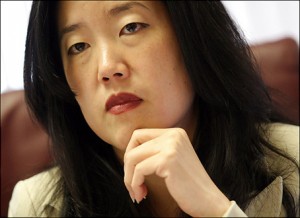Rhee Wrong On What’s Most Important
 I’m not a teacher but Vanessa is, and I get a little defensive when her profession is treated like a punching bag by rampaging reformers such as Michelle Rhee (who spent about three years in the classroom before becoming a know-it-all on teaching). I’ll be the first to admit there are terrible teachers and terrific teachers, and our daughters have experienced both.
I’m not a teacher but Vanessa is, and I get a little defensive when her profession is treated like a punching bag by rampaging reformers such as Michelle Rhee (who spent about three years in the classroom before becoming a know-it-all on teaching). I’ll be the first to admit there are terrible teachers and terrific teachers, and our daughters have experienced both.
But I’m watching this national debate on education reform, teacher qualifications and test scores, it’s killing me, because too many people think there’s a simple, single solution. Consider this sentence from from The Washington Post article on presumptive mayor-elect Vincent Gray and interim D.C. school chancellor Kaya Henderson, who’s replacing Rhee:
“In Henderson, Gray inherits someone in tune with Rhee on the fundamentals of education reform, especially the belief that teacher quality is the most important determinant of student success (emphasis mine).”
Really? THE most important determinant? More important than whether the student has a stable home and enough to eat; whether the student is being mentally or physically abused; whether the student gets enough sleep or attends school regularly?
No, I don’t think so.
Rhee and her ilk love to preach that poverty and other conditions outside the classroom are not an excuse for poor academic achievement. “Our responsibility is to deliver the goods, no matter what the situations our students are in,” Henderson said at an August meeting of school principals.
Rhee and Henderson must not know the difference between an “excuse” and a “reason,” because outside conditions can, and often do, play a role in student success. That’s not to suggest that outside conditions are insurmountable; students from the worst situations can learn and achieve, and many do. And Henderson is correct in stating that teachers are charged with delivering, regardless.
But it’s difficult to rank THE most important determinant of academic acheivement, because everything would work in concert in an ideal world. There’d be great teachers, provided with great resources and support in the classroom, while students would have great parents, providing great resources and support at home. The reality is there’s a sliding scale between those extremes.
If I had to choose one or the other – gun pointed at my head – I’d chose the latter. I contend that it’s easier for great parents to overcome terrible teaching, than it is for terrific teachers to overcome bad parenting.
Then again, what do I know? My name’s not Michelle Rhee.
DS
 Follow
Follow
